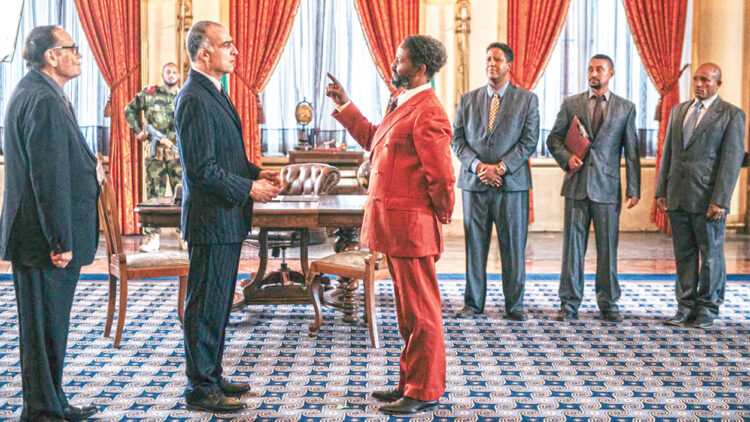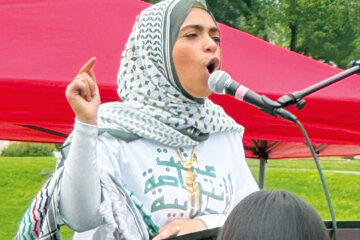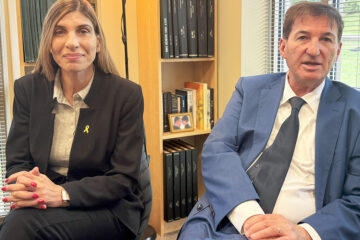Exodus 91 revisits Asher Naim’s work with Ethiopian Jews

By Joanne Palmer, The Jewish Standard
When we’re children, we are taught — and naturally tend to believe — that good things happen smoothly, that goodness always is straightforward. We don’t learn about complications and doubts, much less about working through them, until much later.
We are taught and believe that Ethiopian Jews were flown to Israel “on the wings of eagles.” If we’re lucky, we learn that goodness is strengthened through complications and doubts.
We learn that there were politics involved in getting Beta Israel to Israel; at times, it was ugly. There was racism. There was White-saviorism. There was cultural condescension. There was cultural confusion. And there was no happy-ever-aftering for the group, although many of its individual members have thrived. The community still faces poverty, racism, stereotyping, and bigotry, even at home in the Promised Land.
But Operation Solomon did get 14,325 Ethiopian Jews to Israel in 36 hours in 1991. It was a heroic undertaking, and it was led by an Israeli diplomat named Asher Naim.
OpenDor Media is a punnily named nonprofit organization (door as in a door that opens, and dor as in generation, specifically the younger generation that’s the intended audience for much of the company’s work) that makes video content about Jews and Israel for young people. It has made a film about Asher Naim, a docudrama called Exodus 91. It will be screened June 15 as part of Dayton’s JCC Film Fest.
Naim’s two sons live in the United States: Gideon is in Manhattan, Ari is in Tenafly, N.J. Their sister, Ronit, lives in Israel. Recently, I interviewed Ari Naim about his father.
 “The history behind the movie is that my father was a career diplomat,” he said. But Asher Naim’s childhood didn’t make such a career seem likely. Or even, for that matter, possible.
“The history behind the movie is that my father was a career diplomat,” he said. But Asher Naim’s childhood didn’t make such a career seem likely. Or even, for that matter, possible.
“My father was born in Tripoli, Libya, in 1929,” Ari Naim said. “The family goes all the way back to the expulsion from Spain; they had lived in Libya for hundreds of years. Everything was fine — and then Mussolini came in, and then there was World War II, and things changed.
“So the whole family decided to leave. There were seven brothers and sisters; they and their parents all got on a truck and drove to Israel. As the story goes, it was my father who really pushed them to immigrate.”
That was in 1946, so the Naims found themselves in Palestine. “The children dispersed around the country. The parents got an apartment in Yaffo (Jaffa), and they had their eighth child, the only one born in Israel. My father went to some kibbutz, and then fought in the 1948 war.”
The family was very poor, Naim said; so was the country, as it struggled to survive in those first few years as an independent Jewish state. But his father knew what he wanted.
“He decided that he was going to get educated. He didn’t even know what a university was.”
After the War of Independence ended, the government “gave the soldiers pieces of land to build houses on,” Naim said. “He went up to the Hebrew University in Jerusalem, and talked to a professor there. My father said, ‘I want to learn.’”
He would become a lawyer. He also had to work. “He worked as a laborer and sent money home to his family so they could eat,” Ari Naim said. “He worked in construction as a plasterer. He was a very dynamic person, and he knew people. Someone in the foreign ministry,” where Asher Naim was working in construction, “told my father that when he gets his degree, he also should apply for a job in the foreign ministry.” So he did. “And they said OK and gave him a job as a low-level diplomat.”
He had married during that time. His wife, Hilda Glick Naim, was born in Boston. “She won a scholarship when she was 18, took a boat to Israel, studied at the Hebrew University, and got a teaching degree,” her son said. Hilda and Asher met at the university, and soon they married.
Asher Naim’s first posting was in Japan. He and his wife, Hilda Glick Naim, went together.
“Golda Meir was my father’s boss at one point, when she was the foreign minister, and she liked to say that with Naim, they got two for the price of one,” Ari Naim said. “My mom was the ultimate diplomat.”
Ronit Naim was born in Tokyo, and Ari Naim was born in Nairobi, Kenya. “When they were in Kenya, Golda Meir came to visit them,” Naim said. “They were at their house, having dinner, and my mom said to Golda, ‘I have two kids, but I don’t have a sabra (native-born Israeli).’ Golda said, ‘You’re right,’ so they sent them back to Israel, and my brother was born there.”
But that didn’t stop the Naims. They represented their country — Asher officially, Hilda unofficially but effectively — at the Israeli embassy in Washington, at the consulate in Philadelphia, and later at the United Nations. “Eventually my father became an ambassador, and he opened the Israeli embassies in South Korea and Finland,” Naim said.
“So time passes, and they finished serving in Finland — it was 1990, and they move back to Jerusalem. And then Israeli’s foreign minister said, ‘We have a problem in Ethiopia. We have 14,000 Jews, there are rebels taking over the government, and we need someone to go over there and figure out what to do to solve the problem.’”
The problem was serious. The country was poor and violent; the Jews had gathered in Addis Ababa, the nation’s capital city, living in crowded, unsanitary conditions, standing on interminable lines as they waited to get Sisyphean amounts of paperwork done, so they could go on to the next pile of paperwork. The Israelis already had airlifted about 7,000 Jews to Israel in 1984 in Operation Moses and had managed to get a few hundred out after that. But political corruption and violence in Ethiopia, and the reluctance of many Israeli rabbis to accept the Beta Israel as Jews, mixed in with some pure racism, kept the Ethiopian Jews stuck in Addis Ababa, unwilling to give up and go home but unable to get out.
“This problem comes up. And because my father was at the end of his career by then, he’d been doing this work for a very long time and was a very savvy diplomat, and because he was also from that region, and he was an immigrant himself, those were some of the reasons they sent him there.”
And there was an opening at the Israeli embassy because someone had tried to kill Meir Joffe, the ambassador Asher Naim was replacing.
The movie shows the way that Operation Solomon eventually happened; the often bad-faith negotiations and determination and desperation that led to the escape.

“When my parents got back to Israel, they realized that bringing 14,000 Ethiopians into this high-tech environment was not simple,” Naim continued. “They devoted the rest of their lives to raising funds for scholarships for the kids. They gave out hundreds of scholarships.” Asher Naim died in 2016, “but my mom is a Hebrew teacher, and she’s still teaching at 91. She’s in the same house in Jerusalem that they lived in ever since they went back. She teaches Ethiopian kids. My parents both believed that education was the way out, just as it was for my father. That’s how he got out.” Got out of poverty, got out of hopelessness, got out of despair.
“After our father died, Gideon and I thought that we should do something to continue their mission, of getting Ethiopian Jews a proper education, so we created this movie. We are co-executive producers.
“We started with the idea of a 10- or 15-minute movie, but the director, Micah Smith, had a really good vision about it. He wanted to expand it; to make it not just a legacy film, but to encompass the issues the story brings up. It just evolved, and to Micah’s credit, one of things he did was incorporate the perspectives of the Ethiopians.”
The film mixes scenes done by actors with talking-head shots of the people those actors portray, and at times it pulls back from the actors to show the set they’re on as an artifice as it reveals the people around them, who normally are not on camera.
Some of the staged scenes are quite stagy; others, with children, are less so. Often it’s not clear whether something is real or staged. It does make clear that diplomats are actors, as it tells us at the very beginning, and it impresses on viewers how hard it can be to retain moral clarity when the path to that clarity can be obscured by competing demands, shoving themselves in the way.
“It wasn’t like the Entebbe mission, when the Israelis came, they conquered, they left,” Naim said. Operation Solomon was far messier than that, and “when it was over, there were real people, 14,000 of them, in a small country.”
In 1975, the United Nations passed a resolution determining that Zionism is a form of racism. In 1991, Asher Naim gave an impassioned speech to the body in which he served, talking about the way Israel had gotten Black Jews out of Ethiopia and now was trying to assimilate them.
“One of the things that my father did that I am the proudest of is that shortly after he was sent to the U.N., based on his speech, the U.N. repealed that resolution,” Naim said. “His speech was asking how we could be racist, when we are doing what we are doing? Here I stand? Who am I? An immigrant! A North African Jew!”
The story of the Naims is a story of real belief in goodness as it is battered by reality. It’s about understanding that there are competing realities; at times they’re equally true. It’s about realpolitik and compromise and dashed dreams and misunderstandings and the need to keep trying.
JCC Film Fest will screen Exodus 91 at 7:15 p.m., Thursday, June 15 at The Neon, 130 E. Fifth St., Dayton. With guest speaker Michal Avera Samuel. Tickets are $12 and may be purchased here or at the door.
To read the complete June 2023 Dayton Jewish Observer, click here.





